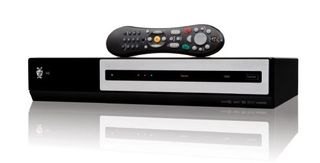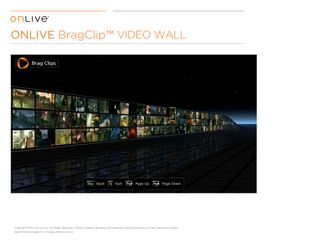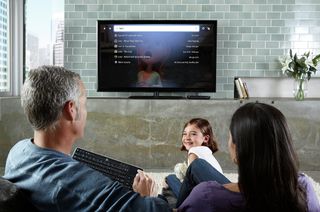Logitech Revue with Google TV: Hands-On Review
Is this product the rebirth of living room computing? We get philosophical, and detail-oriented in our review of the Logitech Revue with Google TV.
Google TV's Big Picture
Is Google TV the holy grail of living room convergence? No. Could it be the iPod of convergence? Maybe. If we've learned anything on the road from the Gateway Discovery to Viiv to Google TV, it's that there are no holy grails. Even breakthrough devices like the PalmPilot and the iPod were merely stepping stones in retrospect. They may have sold millions of units and popularized their device categories, but they were not the pinnacles of technology in their respective fields. There are no pinnacles in this business, only never-ending evolution. We're going to look back in a few years and laugh at how rudimentary and half-baked the Revue and perhaps even Google TV were. Today, though, they mark a quantum leap forward in home entertainment and computing convergence.

Take this example: I have a TiVo Series 3 HD, which was heralded in its day for incorporating YouTube. When it released in late 2008, I tried to find the Christina Aguilera official video for her song, "Keeps Gettin' Better," through the TiVo's Youtube interface -- and couldn't. On a PC, it was simple, but TiVo's interface was plain awful, and I gave up after 15 or 20 minutes. With the Logitech Revue and Google TV, finding the song is a 10-second process, just like being on a PC, and it plays perfectly. In the future, I'll probably be able to speak into my phone/remote/tablet/whatever or merely say out loud into the room, "Play the official Christina Aguilera video for Keeps Gettin' Better on YouTube," and Google (or whomever) will do all of the back-end work necessary to have the right video playing in full-screen at top resolution within seconds -- no keyboard tapping needed. All of the necessary pieces for this already exist. But the move from keyboard to speech is not the tipping point. The tipping point is when mainstream consumers finally "get" convergence and start using the technology on a daily basis. That moment may be now.
Microsoft has been trying to make convergence arrive through the Xbox 360 for quite a while, but the company hasn't been willing to let go of having its game console be the center of the universe. Microsoft of all companies should understand that the world cares less and less about hardware with each passing day. It's the platform that matters, not the device. Microsoft's Azure cloud computing group gets this. The Phone 7 team gets it. It's not too late for Microsoft Live to be the next Google TV...but the clock is definitely ticking.

As I keep flipping through Google TV apps and services, I repeatedly wonder about OnLive and cloud-based gaming. Could Google TV be the search titan's opening move into mainstream gaming?* As OnLive has shown, all it takes is the right license agreements, a little bit of circuitry attached to the TV, and a fat lot of data center horsepower. And if that's possible, what else could Google do with this new pipeline into the living room? We don't know. Not even Google knows, although it doubtless has a bunch of ideas and the endless oodles of data center resources needed to make them happen. Next year, we're going to start seeing those ideas materialize as the Google TV app store and its hardware peripherals ecosystem begin to take off.
The Logitech Revue hardware is well-built, ergonomically excellent, attractive, intuitive, and apparently bug-free. The company has made outstanding use of its harmony remote experience with the Revue's design, and the Vid HD is even better than what I would have expected from my favorite webcam vendor. While it's obvious that the revue is a stopgap product destined to fade away as consumers replace their current non-connected TVs with online-integrated models, this process will take years. Meanwhile, Logitech has a whole new frontier opening up in living room convergence peripherals. Who knows? Maybe we'll even see a Logitech "Homepad" someday.
Sign up to get the BEST of Tom’s Guide direct to your inbox.
Upgrade your life with a daily dose of the biggest tech news, lifestyle hacks and our curated analysis. Be the first to know about cutting-edge gadgets and the hottest deals.
As a Droid owner, I can attest that Android is far from perfect. But as with Google TV, the things that drive me insane about the OS frustrate me in part because they're so close to being spot on. All it would take is just a bit more revision to make this or that feature perfect. Google TV needs more apps immediately, but Google can't let the same riotous sprawl hit living rooms that we've seen on its smartphone marketplace. I expect that as content mushrooms on Google TV systems, we'll want a more efficient way to navigate than single arrow presses -- perhaps gesture-driven ouchpads or even a straight leap to voice or Kinect-type gesturing. But we'll get there. The core ingredients driving Android's success on phones have been ported well enough to the TV to make me believe that this platform will stick. The future of home entertainment will not carry the PC paradigm's dead weight.
Welcome, Google TV. We've been waiting for a long time.

* If Google hasn't yet started down the road to cloud-based gaming, Intel already has. Witness this October 13, 2009 blog post by Intel titled "Intel’s atom processor ce4100, gametree.tv and online gaming, goodbye to consoles?"
Current page: Google TV's Big Picture
Prev Page Search, Chrome, and Amazon On DemandWilliam Van Winkle is a freelance editor and tech journalist who has been writing for more than 20 years. His work has appeared on Tom's Guide, Tom's Hardware, Tom's IT Pro, AMD, Seagate, Computer Shopper, and more. He is also an author, writing poetry, short stories, and science fiction and fantasy books.
-
San Pedro I just hooked up my PC to my TV with an HDMI cable. That works pretty as a media center, pc, and gaming console.Reply -
Hey Will, you can already do voice searches on the Revue using the Harmony app on your Android smartphone.Reply
It's found on the keyboard screen. -
spoonless_eddie Can I see this on my PC? over the net? with open-source software? Can I copy this content to watch on another machine, when I am unplugged? Can I give it away, or donate it to charity, when I am finished with it?Reply
A fool and his money are soon parted. -
"I couldn't see a way to create or otherwise use bookmarks from within the browser."Reply
I suggest pushing the dedicated bookmark button (it's a star) on the keyboard. It matches the yellow star theme that Google has used for bookmarks across many different products. (Google Maps, Chrome, Google Bookmarks, Google Docs, Google Reader, etc, etc) -
cashews Once it has lan support I might give it a try, until then I can't see it replacing a htpcReply -
williamvw mtthwgrms"I couldn't see a way to create or otherwise use bookmarks from within the browser."I suggest pushing the dedicated bookmark button (it's a star) on the keyboard. It matches the yellow star theme that Google has used for bookmarks across many different products. (Google Maps, Chrome, Google Bookmarks, Google Docs, Google Reader, etc, etc)Bam! You're quite right. Somehow, I totally missed that. I just tried it: went into Google Docs, hit the star button, told the pop-up to make the link into a bookmark, and there it is in my Bookmarks section. (Note also that the pop-up gives you the option to send the page to your Queue rather than the Bookmarks.) That said, I think the thing that threw me was the bookmarks being separated from the main Chrome UI. Perhaps it would be more intuitive if there was a small icon in the corner of Chrome that spawned a fly-out bookmarks menu? Food for thought. Still...my bad, and thank you for the correction, mtthwgrms.Reply -
topcold "I couldn't see a way to create or otherwise use bookmarks from within the browser. "Reply
Have you tried using the keyboard shortcuts from the PC browser? (I don't know if that works, but people are saying most of the keyboard shortcuts are the same)
"but Google can't let the same riotous sprawl hit living rooms that we've seen on its smartphone marketplace"
Its called 'choice' - if you want someone else to make the choices for you, you could always get Apple TV ;)
"Perhaps this is why Google is waiting until next year to open up its TV app store and broaden its functionality."
No, here is why: Each version of Android has certain compatibility definitions manufacturers must follow if they want to be considered a fully compliant Android device.
They don't have to - but then they don't get access to the proprietary Google apps, like the market)
So, amusingly enough, according to Googles own guidelines, Google TV is not a compliant Android device (for instance, version 2.1 of Android requires the device to have GPS - obviously Google TV doesn't have a GPS nor need one) - so instead of giving themselves permission to break the rules (and risk lawsuits and angry manufacturers) they adhered to the rules and didn't add the market.
Now the next version of Android is very close, and there they can make sure to phrase the new rules for requirements in such a way that Google TV will be compliant. And since the new rules apply to everybody, nobody need get upset.
